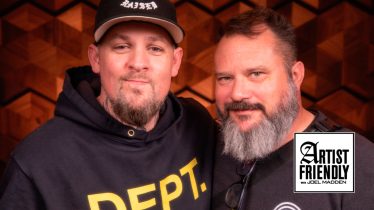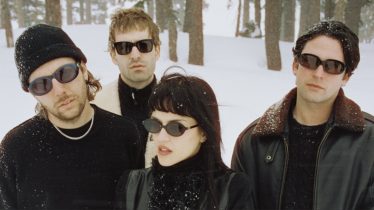
Track By Track: Star Fucking Hipsters
(Photo: Alyssa Tanchajja)
Sturgeon from Star Fucking Hipsters takes AP track by track through their latest, From The Dumpster To The Grave, out this week via Fat Wreck Chords.
“Intro”
I always have felt the need to have some bit of music or a sample of some sort announcing the start of the records I've been involved in, something to adjust the stereo volume to.
“Dumpster To The Grave”
I always like to put a decent “rocker” at the beginning of my records. This song was really reminiscent of some of the early Choking Victim songs, just a little less melodic. I still go out and dumpster dive to this day; it's something that has helped me survive many cold, lean winters. If you were to go through song lyrics I have written for all of my bands, you'll find only a handful of songs that refer to squatting, hopping freight-trains, being homeless and crusty. This was part of that world of mine that I never wrote about. I love pigeons and squirrels, as a non-spiritual New Yorker, they're the closest things that I have to spirit animals. Rats don't bug me either, but I do find the fact they freak people the fuck out really charming.
It's related to the whole squatter/crusty lifestyle. Crusties eat pizza crust or will dig through some gory stuff to get perfectly good food that society wastes; if you're above that and still have a bunch of spikes and patches sewn on your stuff, you're a house-punk. It's not supposed to be a point of contention between the two worlds, though it is. At this point I have a lot more house-punk friends than straight-up Crusties, but I'm in my mid-thirties. A lot of my friends that stayed on the streets are dead. I really like Chris [Pothier]’s bassline on this one.
“War Widows Vietnam”
I've never heard anything about the aftermath of the “conflict” in Vietnam ([which was] never officially declared a war by the U.S. government) from the point of view of the people devastated on the side of the Vietcong—or even those left behind that fought along with U.S. soldiers. I tried very hard to research this subject matter for this song and found nothing. I assume there are many documents, but that they are in the native language. I also felt it necessary to include the grief felt by families state-side, which draws comparisons to the current “conflicts” that leave so many people without sons, daughters, wives, husbands and other loved ones.
“Death Is Never Out Of Fashion”
This song is about so many of our friends that have died over the years, a subject I have skirted on many songs. It's also about society's madness, how certain ways of living leave a lot of people in desperate situations and about how frail our lives can be—given the regularity that someone that I know (or my friends know) dies, and how the older we get and the longer we survive, the amount of death that directly affects us rises almost perpetually. It also comments on how the lies we are told throughout our lives by the media and “authorities” can affect our mental abilities to cope with life on society’s terms, especially after we discover the truth. An amazing bass-line penned by Frank [Piegaro] really drives the verses along.
“The Broken Branches”
This song is about the more macabre side of what a family tree symbolizes. It's about skeletons in closets and how people are decidedly not defined by who birthed them or what their relatives have done in the past. If everybody was forced to answer for the sins of their ancestors, the whole world would be guilty of horrific crimes. This line of thinking leads to the false entitlement that many people seem to have, as well as being another trap that leads to the easy manipulation of the collected masses through the class and caste systems. Yula [Beeri] sings and lends a nice feel to the intro and outro. This has the one verse on the record where Nico [de Gallo] really rose to the occasion and belted it out.
“The Spoils of War”
This was a song written for our previous record, but finally surfaced for Vol. III. It's about how the institutions of imperialism and war exist to line the pockets of the wealthy people that dictate these invasive policies and use your children and labor as their cannon fodder. One of the few songs where I've had zero musical contribution.
“Otra Vez!”
This song is about current border politics versus how this country was stolen from the native people and then populated and redefined by immigrants and the inherent hypocrisy of denying entrance to others so they too can benefit their lives and the lives of their families. Much of it was written in my none-too-perfect Spanish, and we have Santa Cruz's brilliant Blackbird Raum playing their unique busker/gypsy/folk instruments over a partially eastern-European, partially Latino song written mostly by our guitarist Frank who does an amazing Santana-esque solo at the end of the song.
“Honey, I Shrunk The cops!”
The lyrics for this song were inspired most directly by the execution of Oscar Grant by the BART police in Oakland in the early hours of New Year’s Day 2009. They deal with the grief of the family and friends of an innocent, unarmed victim of police brutality and murder. It's about how our tax dollars pay for such misuse of authority and how they are the soldiers in a class war protecting the interests and property of the rich. The chorus has a bit of a Jane's Addiction-y feel to it, they were my favorite band until they broke up when I was about 14 years old. This is one of my favorite songs on the record, musically.
“9/11'Til Infinity”
This one was up in the air forever. It contains a fairly general chant/chorus so that Boots Riley and I could have some room to write our rapped verses. It's the first disco song I've written. Hopefully it's danceable to people besides myself and Boots. It's a head-bopper, at least. This is another song that we've been playing for over a year, and the verses were some of the last written and recorded. We would open up our sets with this as an instrumental. That's how Boots heard it at a show where he was rapping with our friend Miguel playing old-timey guitar.
“Ana Ng”
This is the first tune that kind of bought Mikey Erg into the band. We are both huge They Might Be Giants fans, and we've never heard of a band covering any of their hundreds (thousands?) of songs. We had so many favorites that it was hard to pick one. We settled on “Ana Ng” because it was the first song that I had ever heard from them, and I immediately liked it and bought the record it was on. It seemed to work really great as a ska tune and the only problem was that it was almost completely out of mine and Kelsy's singing ranges, so I barely made it through the thing and we had Yula Beeri come in and knock it out in a few takes.
“Rapture, Rinse, Repeat!”
A point came where we were waiting for 3 months to get back into the studio to continue work on this record, and I realized that we had no “bubble-gum crust”; the whole record was pretty damned pop-punk with a lot of ska, and even the heavier songs were pretty melodic. So I was in Oakland, and I started asking around for a drummer that could play double kick and do a few songs with me and Frank out there. I called Jesse Townley (Alternative Tentacles manager/Gru'ups/Blatz singer) and he suggested I call Mauz [Parillo], who was in one of my all time favorite bands, Dystopia. I had been friends with him and Dino in the mid-’90s, but hadn't seen him since. I gave him a call and after a few days he said he had a drummer, Scotty [Heath] from Deadfall who runs Tankcrime records—but that he and Dave [Edwardson, Neurosis bassist] would be joining us. I have also thought of Neurosis as one of my all-time favorite bands and you can definitely hear Dave's influence on the bass, reminiscent of Word As Law-era Neurosis. We had been discussing the coming and then going of the Rapture that was supposed to have occurred in May, which was an idea started by a local Oakland church.
“Drowning Out Another Year”
This was always gonna be our record closer. It's one of the first songs that we had for the record over a year ago, and it was the final song to have lyrics written. I really like this one a lot; it especially benefited from having the saw on it. There was a lot of deliberation about which instrument would be best. We almost had a theremin, but it became quite clear that the involvement of the theremin became a huge source of excuses and time-wasting early on with one of our engineers, so in the end, we were lucky to have the saw in NYC on the last day of recording.
The lyrics themselves were informed by an organization that showed me in great detail how shockingly disorganized and sycophantic it can be. Perhaps I saw them at their worst, but what was presented to me was the opportunity to blame all of my past mistakes on drugs and alcohol and to end my life as I knew it, including my creativity, critical thinking and non-conformity. The biggest issue for me with the people that I dealt with was that they felt the need to lie to me for reasons beyond my comprehension. In Alcoholics Anonymous, you can be an atheist, but not an anarchist; you must pick a higher power no matter what. I had a great friend, now deceased, that chose gravity, which I thought was a fairly smart one.
After much deliberation, I came to the conclusion that my higher power is alcohol. This song discusses AA and the weird hypocrisy that became inherent when I was told that they wanted me to be on all kinds of mind-bending medications, just not the ones that I had chosen up to that point in my life. I met zombies that were being dosed with thousands of milligrams of Seroquel, amongst other crazy shit that alcohol really can't touch. They dosed me with crazy things to help me sleep that just gave me what would of been horrifying hallucinations if it were not for the fact that I understand what hallucinations are. I know that AA is something that works for many people, but I refused to let them brain-wash me, which is what it would have taken for me to have submitted to the cultish, repetitive mantras—including many of the most boring complaints repeated ad nauseam, interspersed with some truly amazing and interesting tales of insane decadence.
“Outro”
This record was the hardest I've ever had to fight to get something done. I don't mean in the physical sense, but so many roadblocks were hit that I came to a point where I thought that a year of my life had become wasted by this all-consuming beast. We had more songs that needed finishing, but deadlines and a basic lack of solidarity conspired to limit some of the great ideas that we started with. I really hope that people open up to the ideas of not limiting a band to any particular musical genre. I get the feeling that people like to box things up and pigeonhole them. I like to think of this record as the musical essence of non-conformity. There is an outro only because I like to have 13 songs on the records I'm involved in.







